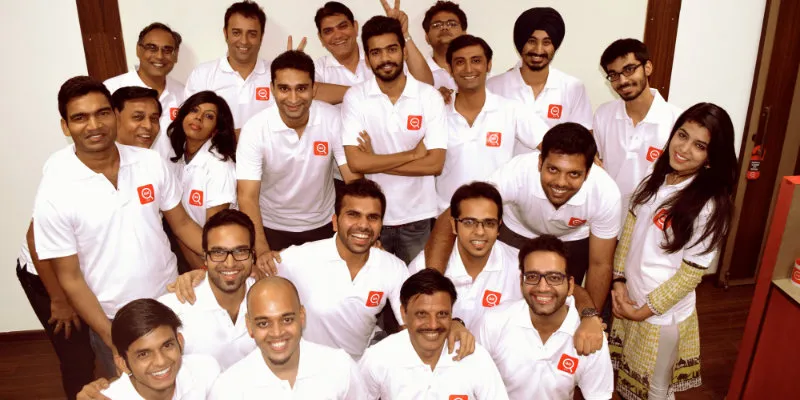How this 27-year-old experimented with various business models to build a sustainable budget hotel platform
The ideas for the best businesses tend to come from personal experience,” Virgin Founder Richard Branson wrote in a recent Trinidad Guardian blog. Qik Stay came about along similar lines.

A few years ago, when Jasveer Singh was looking for a paying guest (PG) accommodation in Gurgaon, he faced various difficulties. This personal experience motivated him to enter this segment and root out the problems faced by many like him.
The business idea emerged in the form of Sparehousing.com, a platform that helped property lookers find PG accommodation. He ran the business for some months and pivoted the business model to a guest-house chain. He named this business ZoZo.in.
Around the same time, OYO Rooms was emerging in the hospitality industry. Jasveer observed the operations of this budget hotel marketplace and decided to build something similar.
He again pivoted the model. In January 2015, he and his two co-founders launched ZoZo Stay, an asset-light model wherein guest houses were made available on an hourly basis. However, by July, they rebranded ZoZo Stay as 'Qik Stay' due to the similarity between the company's name and that of ZO Rooms. It wasn't just the name that was changed, however. Jasveer also pivoted the basic business model of his startup. He wanted to become a company that rebrands hotels, and not just aggregates them.
“Budget hotels in the country are as unorganised, and their policies are as translucent as they can get. Even after having an online presence through OTAs (Online Travel Agents), most of the budget hotels neither carry a brand value nor transparency. Although the new-age hotel aggregators are doing a good job in bringing more unorganised hotels online, they’re not solving the problem of quality and trust deficit, thereby making them almost similar to conventional OTAs. We believe with standardised operations and regular quality checks, we can achieve cost-synergies in the medium-to-long term of our partnership with hotels. This will make this co-branding model sustainable compared to the price wars which some of our main competitors are playing,” says Jasveer, who is the CEO of Qik Stay.
Coming from a hospitality background gave him and his team insights into the industry. “We understand what the customers need and we know what the hotel owners want, which basically helps us strategise from a holistic perspective,” Jasveer explains.
Initial struggles
It is always a difficult task to find the right talent, especially for a startup. “For me, it was all the more challenging given the fact that I come from a non-tech background. Nonetheless, our strategy of hiring experienced IT professionals and giving them autonomy has been doing just about perfect,” adds Jasveer.
Growth numbers
The startup started out with a seed funding of $250,000 from ID Enablers. Initially, it spent the investment in technology and team development. Now, it’s spending on building the brand and taking it out to the public.
Also Read: How venture-backed startups are trying to solve the accommodation problem in India
The Gurgaon-based platform claims to have presence in over 60 cities and has partnered with more than 250 hotels. It’s also planning to focus on bulk bookings through corporates.
The platform works with its partner hotels on a revenue-sharing basis, offering a large part of the booking amount to the hotel owner and keeping the remaining part of the pie.
Qik Stay is in talks with a few venture capitalists and plans to raise funds soon for further expansion of operations and marketing.
Stiff competition
In the estimated budget hotel aggregation market, which is anything between $25 and $40 billion, various platforms are vying to grab the larger part of the segment.
OYO Rooms, Wudstay and Stayzilla, among others, are some of the known players in this segment.
Qik Stay says that it’s looking at capturing close to one-fourth of this market size. Its expected revenue for FY17 is Rs 180 crore.
The platform considers OYO Rooms as its biggest competitor in the industry. “To outstrip them, we’re creating our own category – that is the uppermost layer of the budget hotels market. Our average per-night rate is between Rs 2,000 and 2,500,” says Jasveer.
Customer acquisition is concentrated on the B2B market, capturing the corporate customers of corporate cities. The startup claims that it has 50 companies on-board as its business to venture partners.
Brand has responsibility
Jasveer says that maintaining quality in this space is a very big challenge. For this he has assigned people to do regular quality checks and ensure quality throughout.
YourStory take
In the past one year, the billion-dollar budget hotel industry has witnessed various developments, from many new players entering the segment, to the rising interest of investors like Tiger Global and Softbank in the industry.
Amidst the buzz, the deal between OYO Rooms and ZO Rooms is a curious case in the industry. The latter entering the segment, raising rounds of funds and now bequeathing the business to OYO raises questions on the business model of the industry.
Besides, many smaller acquisitions have also happened in the industry. In August last year, Wudstay acquired Awesome Stays. During summer last year, Australia-based StayWell Hospitality was also trying to acquire a budget segment Indian hotel chain with plans to invest over Rs 158 crore in hospitality business in India.
It is true late comers in the segment have learned a lot from the mistakes made by their predecessors who went out there in the market to experiment with various models. However, the budget hotel hospitality market is still not foolproof and holds many surprises. With international players also eyeing the market, a new picture is bound to emerge with their entry into the segment.







